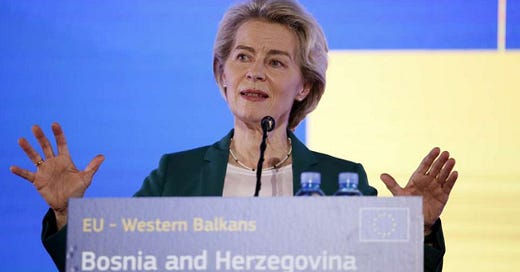Is Bosnia ready to join the European Union?
Can and will Bosnia and Herzegovina become a candidate country to the European Union this year?

Two weeks ago, the European Commission recommended to the European Council to grant the EU-candidate status to Bosnia and Herzegovina, just like it did for Ukraine and Moldova earlier this year.
Bosnia and Herzegovina has been a potential candidate for EU membership since 2003 and formally applied for it in February 2016 and the Commission identified in 2019 14 key priorities for the country to fulfil in view of opening EU accession negotiations - Euractiv
What is the political situation in Bosnia and Herzegovina?
Bosnia has one of the strangest political systems in the whole of Europe. The country is led—or rathered oversaw—by an international peace envoy, the German Christian Schmidt, acting as High Representative for Bosnia and Herzegovina.
He is responsible to oversee the civilian implementation of the Dayton agreement, the US-backed treaty that granted peace in the country after the 1993 conflict with neighboring Serbia.
Bosnia and Herzegovina is divided into ethnic and geographical entities, with the Federation of Bosnia and Herzegovina (FBiH), Republika Srpska (RS), and Brčko District (BD). Political institutions are divided among three ethnic and religious groups: the Muslim Bosniacs, the Orthodox Serbs, and the Catholic Croats.
In the middle, the Bosnian youth rejects this ethnic and highlyèdevisive political system and would like to move forward. To some, accession to the European Union feels like a possible way out of an otherwise deadlocked situation.
Why did the Commission recommend Bosnia for EU candidacy?
Similar to Ukraine’s accession, the objective is to send a message and give support to a destabilized question. While in the case of Ukraine, it was in the context of the war, the European Commission would like to encourage Bosnia to complete key democratic reforms.
The European executive identified eight points for which Bosnia could make immediate progress, such as rule of law, justice, elections, public procurements, and public financial management. Once the country advances on these issues, it would be far ahead to implement the 14 the EU had earlier given for a full candidacy.
The Commission hopes that the newly elected Bosnian lawmakers (following the 2 October elections) could be encouraged to aggressively start these reforms if they feel that the EU is behind them.
Yet, the final decision remains up to European leaders, which might take a decision the decision to accept Bosnia as a candidate in December
Is Bosnia ready to become an EU member?
In my opinion, granting the EU candidate status to Bosnia would be a premature and risky decision.
Although the Bosnian youth is ready and rightfully demands accession to the European Union, Bosnia has the least stable political system in Europe, is subject to incredible ethnic tensions, and its institutions come from a Washinton-backed agreement, not of its own free will.
A lot of reforms must happen before the candidacy can be fully considered. But “where there is a will, there is a path,” as the European Commission President Ursula von der Leyer reminded newly-elected Bosnian representatives in Sarajevo.
Yet, I do not believe that the Council would give its approval so soon. In fact, Bosnia might wait for another couple of years before a candidacy could be seriously considered by the Council. And before that, the country would have to reform itself in full.






Well written, thanks for the article.